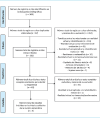[Use of immersive virtual reality for cognitive rehabilitation of patients with brain injury]
- PMID: 35548914
- PMCID: PMC11502186
- DOI: 10.33588/rn.7410.2022034
[Use of immersive virtual reality for cognitive rehabilitation of patients with brain injury]
Abstract
Introduction: Virtual reality (VR) is a therapeutic tool that is widely used in the cognitive rehabilitation of brain-damaged patients. Depending on the degree of immersiveness, a distinction can be made between non-immersive, semi-immersive and immersive VR. Studies assessing the utility of VR have focused on the non-immersive and semi-immersive modes. Little evidence is available on the effectiveness of immersive VR.
Aim: To describe the characteristics, methodological quality and main results of studies that have applied immersive VR programmes in the cognitive rehabilitation of brain-damaged patients.
Materials and methods: Following the PRISMA guidelines, a bibliographic search was conducted for studies published in the PubMed and PsycINFO databases. The methodological quality of the articles that met the selection criteria was assessed using the PEDro scale.
Results: After applying the inclusion and exclusion criteria, of the 369 articles of potential interest, five met the eligibility criteria. One of them was a randomised clinical trial (with acceptable/good methodological quality). Three were studies with pre- and post-treatment measures and one was a single case study, all four of them displaying poor methodological quality.
Conclusions: According to the results obtained, there is no evidence of the effectiveness or utility of immersive VR in cognitive rehabilitation in brain-damaged patients. This finding is explained by the lack of studies with a methodological design that allows for the generation of quality evidence rather than because the results obtained in the articles analysed are negative or inconclusive.
Title: Uso de la realidad virtual inmersiva en la rehabilitación cognitiva de pacientes con daño cerebral. Revisión sistemática.
Introducción. La realidad virtual (RV) es una herramienta terapéutica ampliamente utilizada en la rehabilitación cognitiva de pacientes con daño cerebral. En función de su grado de inmersividad, se puede diferenciar entre RV no inmersiva, semiinmersiva e inmersiva. Los estudios que valoran la utilidad de la RV se han centrado en las modalidades no inmersiva y semiinmersiva. Apenas se dispone de evidencias sobre la eficacia de la RV inmersiva. Objetivo. Describir las características, la calidad metodológica y los principales resultados de los estudios que han aplicado programas de RV inmersiva en la rehabilitación cognitiva de pacientes con daño cerebral. Materiales y métodos. Siguiendo las directrices PRISMA, se realizó una búsqueda bibliográfica de los trabajos publicados en las bases de datos PubMed y PsycINFO. La calidad metodológica de los artículos que cumplían los criterios de selección se evaluó mediante la escala PEDro. Resultados. Tras aplicar los criterios de inclusión y exclusión, de los 369 artículos potencialmente interesantes, cinco cumplieron los criterios de elegibilidad. Uno de ellos era un ensayo clínico aleatorizado (con una calidad metodológica aceptable/buena). Tres correspondían a estudios con medidas pre- y postratamiento y uno a un estudio de caso único, los cuatro con una calidad metodológica pobre. Conclusiones. De acuerdo con los resultados obtenidos, no hay evidencias de la eficacia ni de la utilidad de la RV inmersiva en la rehabilitación cognitiva en pacientes con daño cerebral. Este hallazgo se explica por la falta de estudios con un diseño metodológico que permita generar evidencias de calidad y no porque los resultados obtenidos en los artículos analizados sean negativos o no concluyentes.
Conflict of interest statement
Conflicto de intereses: No declarado.
Figures
Similar articles
-
Immersive virtual reality in traumatic brain injury rehabilitation: A literature review.NeuroRehabilitation. 2018;42(4):441-448. doi: 10.3233/NRE-172361. NeuroRehabilitation. 2018. PMID: 29660958 Review.
-
Virtual reality distraction for acute pain in children.Cochrane Database Syst Rev. 2020 Oct 22;10(10):CD010686. doi: 10.1002/14651858.CD010686.pub2. Cochrane Database Syst Rev. 2020. PMID: 33089901 Free PMC article.
-
The effects of virtual reality environment simulations on balance and gait rehabilitation in persons with lower extremity amputation.Prosthet Orthot Int. 2025 Mar 5. doi: 10.1097/PXR.0000000000000428. Online ahead of print. Prosthet Orthot Int. 2025. PMID: 40043037
-
The use of virtual reality for activities of daily living rehabilitation after brain injury: A scoping review.Aust Occup Ther J. 2024 Oct;71(5):868-893. doi: 10.1111/1440-1630.12957. Epub 2024 May 17. Aust Occup Ther J. 2024. PMID: 38757659
-
Virtual reality gaming as a neurorehabilitation tool for brain injuries in adults: A systematic review.Brain Inj. 2020 Aug 23;34(10):1322-1330. doi: 10.1080/02699052.2020.1802779. Epub 2020 Aug 13. Brain Inj. 2020. PMID: 32791020
Cited by
-
Aphasia improvement without logotherapy during motor neurorehabilitation of post-stroke hemiparesis using virtual reality or modified constraint-induced movement therapy: A retrospective cohort.NeuroRehabilitation. 2023;53(4):585-594. doi: 10.3233/NRE-230183. NeuroRehabilitation. 2023. PMID: 37927287 Free PMC article.
-
[Use of Virtual Reality Based on Daily Activities for Cognitive Rehabilitation After Stroke: A Systematic Review].Rev Neurol. 2025 Apr 28;80(3):37507. doi: 10.31083/RN37507. Rev Neurol. 2025. PMID: 40296539 Free PMC article. Spanish.
References
-
- Borrego A, Latorre J, Alcañiz M, Llorens R. Comparison of Oculus Rift and HTC Vive:feasibility for virtual reality-based exploration, navigation, exergaming, and rehabilitation. Games Health J. 2018;7:151–6. - PubMed
-
- Lange B, Koenig S, Chang CY, McConnell E, Suma E, Bolas M, et al. Designing informed game-based rehabilitation tasks leveraging advances in virtual reality. Disabil Rehabil. 2012;34:1863–70. - PubMed
-
- Lee JH, Ku J, Cho W, Hahn WY, Kim IY, Lee SM, et al. A virtual reality system for the assessment and rehabilitation of the activities of daily living. Cyberpsychol Behav. 2003;6:383–8. - PubMed
Publication types
MeSH terms
LinkOut - more resources
Full Text Sources
Miscellaneous


